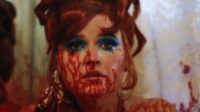The summer game having been an American staple for so long, it’s only natural that baseball films have come along to capture and extend the love and appreciation for the game that we here at Film Obsessive (at least, some of us!) share. Thus, to celebrate this week’s Opening Day of the Major League Baseball season, we thought we might share some recommendations for our favorite baseball films, for both the film-loving baseball fan and the baseball-curious cinephile. These are films that, as you might say, knock it out of the park.
The Natural (1984, dir. Barry Levinson)
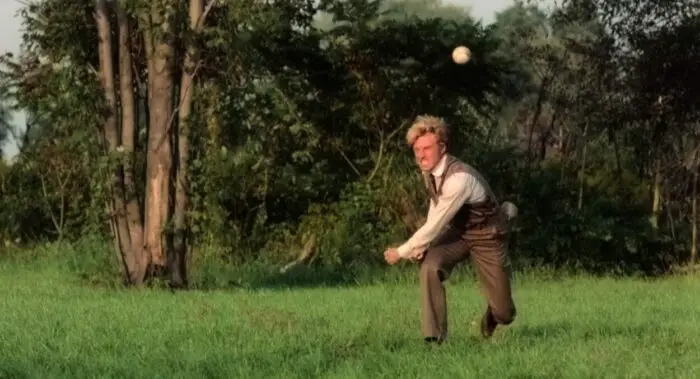
The 1984 Barry Levinson baseball drama The Natural may not be well known to young baseball audiences, but those who have seen it know its electric moments. Adapted from the 1952 Bernard Malamud novel of the same name, The Natural tells the story of terrific baseball talent Roy Hobbs (Robert Redford). Early in the film Hobbs is destined to make the big leagues as a big arm pitcher with can’t miss stuff, and a bat he made himself named “Wonderboy” that he made from nearby tree that was struck by lightning. After a near fatal encounter with a femme fatale, he drifts into obscurity. He resurrects years later as an old and mysterious hitter, bringing his special hitting talents to the fictional New York Knights in need of a spark in 1939.
Levinson employs the talents of cinematographer Caleb Deschannel, whose compositions add to the legend of Roy Hobbs and was nominated for an Academy Awards (one of three nominations for the film). Redford pulls off the redemption arc with understated charm and his natural ability on a baseball diamond. The cast features a stable of stars and character actors: Wilford Brimley, Richard Farnsworth, Kim Bassinger, Darren McGavin, Robert Duvall, and Glenn Close. Above all, The Natural features a few scenes that are iconic in baseball film lore: Hobbs striking out The Whammer, busting the clock with a home run at Wrigley Field, and concluding the climatic game with a “lights out” ending. Randy Newman’s iconic musical motifs enhance those spine-tingling moments to make The Natural one of the best baseball movies. — Seth Lamey
Sugar (2008, Dir. Anna Boden & Ryan Fleck)
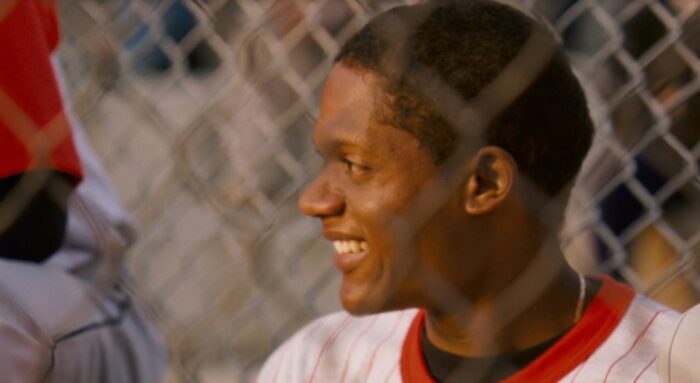
Here is a very classic setup: a promising, perhaps gifted young player tries to make his way up to the majors. It’s Rare, though, to see a film like Sugar, about a player trying to make his way to the majors all the way from the Caribbean. Miguel “Azucar” Santos (Algenis Perez Soto) is a Dominican pitcher who gets called up to play minor league ball in the states, and gets transplanted straight from San Pedro into the middle of Iowa. Miguel’s first season in professional baseball is marked with the signature highs and lows, punctuated by the seemingly limitless promise of professional baseball, and the stark poverty that he’s to return to if he fails, just as so many of his friends do.
Baseball is a global game, and the stories of Latin American players in the majors in America are increasingly important as their talents have become increasingly recognized. Sugar tackles the pressures of rising out of poverty and just how difficult it is to truly make it. (For an excellent real-life story on this very topic, check out the 2022 documentary The Last Out.) The film is a great reflection of the immigrant experience and coming of age in America, surrounded by pressure to work and perform, but seeking community and acceptance above all. Sugar kind of meanders until it settles on this point, but the journey itself is the main attraction, its narrative like a baseball picaresque. — Chris Duncan
A League of Their Own (1992, dir. Penny Marshall)
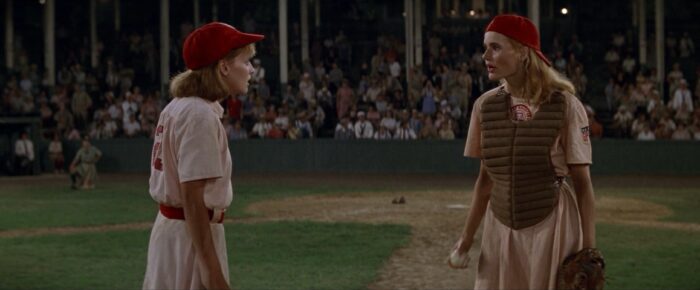
Most baseball films are dominated by the stories and heroics of great men and boys, but in 1992 director Penny Marshall changed all that with her exciting and heart-warming sports drama A League of Their Own. Based on the true events of the All-American Girls Baseball League, the story follows the Rockford Peaches in the inaugural season of a newly created women’s baseball league during World War II. It stars Geena Davis as all-star catcher Dottie Hinson, Lori Petty as her plucky pitching sister Kit, with fun supporting performances from Madonna and Rosie O’Donnell. Tom Hanks stars as manager Jimmy Dugan, former slugger turned fall-down drunk.
What makes A League of their Own one of the best baseball movies is not just the refreshing, diverse take on the game and passion found in the sport, but how earnest Marshall is in telling the story within the world it happened. The 1940s feel very real for a film released in the early 1990s, and the cast collaborates to show the trials and tribulations of a newly formed baseball league. Not only were the women players up to the task of the men (doubleheaders in the hit, long bus ride road trips), they did so with class and grace to win over those who didn’t believe it could work. Tom Hanks as Jimmy Dugan is an all-time classic baseball buffoon, alternating between hot head manager (infamous “No crying in baseball!” scene) and good guy with a heart of gold as he embraces Hinson as his best player and friend. The musical score of Hans Zimmer is rousing, and the baseball scenes are shot with excitement and realism for the game play itself. All these reasons add up to it being a timeless classic and one of the best baseball films. — Seth Lamey
Major League (1989, dir. David S. Ward)
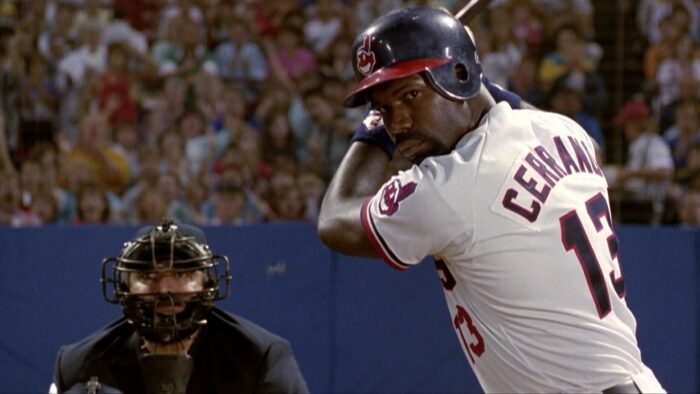
To watch Major League is to have an infectious love for the game and culture of baseball rub off on you. It’s a film centering on a major league baseball team (the former Cleveland Indians) whose new owner (Margaret Whitton) wants to completely tank the team so she can relocate it to Miami, which in 1989 still lacked a proper major league team. She purposely has her front office put together a team bad enough to do the job, including Ricky “Wild Thing” Vaughn, a pitcher who cut his teeth playing in prison (Charlie Sheen), Roger Dorn (Corbin Bernsen), the whiny late-career third baseman, and Willie Mayes Hayes (Wesley Snipes), an outfielder who just shows up to spring training, all anchored by Tom Berenger’s Jake Taylor, a washed-up catcher with one last chance to prove he can still play. The scrappy team wills itself to success and hijinks as their owner tries her best to sabotage them.
Major League is certainly a dated and campy effort, but it’s got no shortage of sincere charm. Its cast is fun, and it is a nice underdog story about loving the game and sticking it to the dispassionate suits, as well as, of course, the Yankees. It is also a celebration of fandom and how silly it can all feel to endure years of failure and disappointment and keep coming back with gusto for your team. My friends and I often joke about “the power of friendship” in explaining how teams can inexplicably succeed against the odds, and Major League is a goofy testament to that and the idea that baseball is a bit more democratic than your average team sport. — Chris Duncan
The Costner Films
For a time, breakout ’80s heartthrob Kevin Costner was Hollywood’s go-to guy for baseball pics. So let’s consider his three baseball films together. They’re not exactly a trilogy—they share no themes, tropes, or content except a love of the game and a workmanlike competence—but to see an A-list actor devote three full feature-length films to a single sport (one never a box-office bonanza) in a decade’s time is unprecedented. These films may have their faults (well, maybe Bull Durham doesn’t), but their affection for the game is inarguable, and in each Costner makes for a perfectly credible ballplayer and charismatic protagonist.
Bull Durham (1988, dir. Ron Shelton)
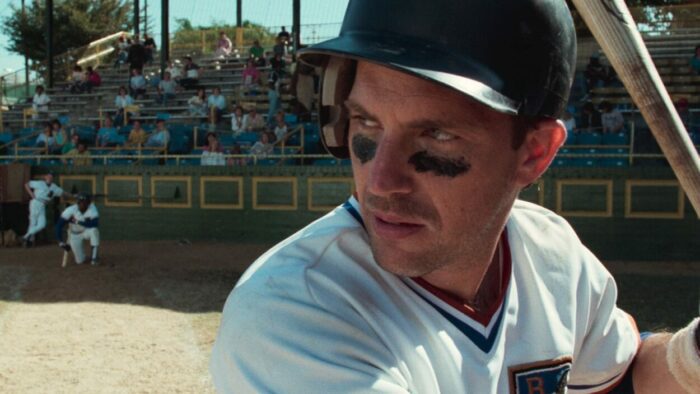
Like a Dwight Gooden in his rookie season, Costner made his first appearance in a baseball film his best. Bull Durham, written and directed by Ron Shelton in his debut, is bold, brash, and funny, making—of all places—minor-league baseball as the site of a smart, sexy farce of a love triangle. Annie Savoy (Susan Sarandon) likes to herald each new Durham Bulls season by bedding a rookie. Wildman Nuke LaLoosh (Tim Robbins) is this year’s more-than-willing mark: he’s a bona fide prospect if he can only find the plate. Between the two is Costner’s Crash Davis (Kevin Costner), Nuke’s mentor and Annie’s longtime friend with benefits. With each of its leads cast perfectly and the Oscar-nominated screenplay crackling with sizzle and spark, Bull Durham feels like an inside-the-park home run for all involved: an unlikely confluence of serendipities coming together with an unexpected, if absolutely delightful, outcome. In other words, a perfect baseball film. — J Paul Johnson
Field of Dreams (dir. Phil Alden Robinson, 1989)
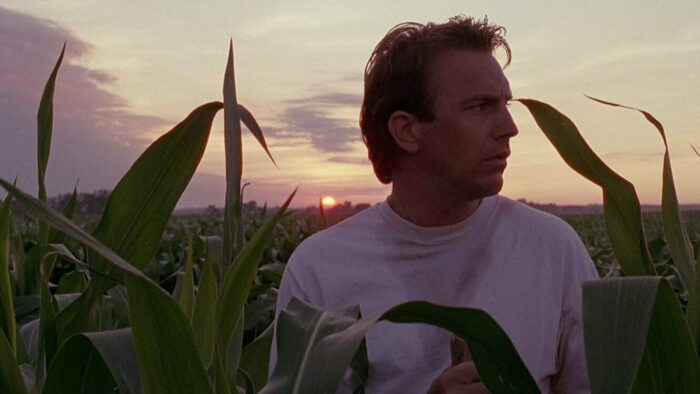
After Bull Durham, Costner was so indelibly associated with his character that Field of Dreams‘ producers thought he wouldn’t want to take on another baseball-player role for fear of being typecast. (They had Tom Hanks in mind.) But they were wrong: Costner was more than willing to lead the adaptation of W. P. Kinsella’s Shoeless Joe. The film—a fairly close adaptation save for reworking the litigious J. D. Salinger character as Terence Mann (James Earl Jones)—treads in fantasy, Costner’s character a farmer who builds a baseball diamond in his cornfield that houses the ghosts of legends Shoeless Joe Jackson (Ray Liotta) and his other teammates on the infamous World Series-throwing Chicago Black Sox.
Studio execs feared the whole project seemed too esoteric but eventually forged ahead, and the film was a surprise hit with audiences and critics both. I’ll confess it’s a bit too treacly for my tastes, but Field of Dreams struck a chord with audiences who loved the game and a good bit of paternal melodrama. But then again, what is the national pastime about but sharing hopes and dreams between generations? Earning back nearly six times its budget and three Academy Award nominations, including Best Picture, Field of Dreams became a legacy film for the sport: it’s part of the National Film registry and the ballpark constructed for its production is now a beloved tourist attraction (and actual MLB venue). “If you build it, he will come,” indeed. — J Paul Johnson
For Love of the Game (1999, dir. Sam Raimi)
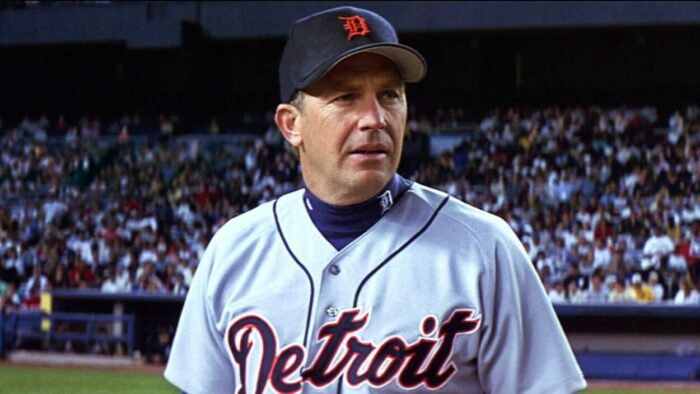
In the wake of the success of Bull Durham and Field of Dreams, Kevin Costner became one of Hollywood’s power players, gracing the cover of Time and soon taking home an Oscar as director of Dances with Wolves. But the post-apocalyptic sci-fi films Waterworld (1995) and The Postman (1997), the latter of which he directed as well as starred in, were big-budget failures and by the end of the decade, his star was on the wane. So returning to his former field of glory in a tale of a man seeking one last perfect performance seemed sensible. Perhaps a little less sensible seemed the choice of Sam Raimi to direct: he’d followed up his indie hits with the critically derided The Quick and the Dead and hardly seemed the right person to helm the straight-arrow For Love of the Game, a dead-serious drama adapting Michael Shaara’s unpublished novel of the same name. Costner plays aging pitcher Billy Chapel in the twilight of his career and delicately navigating a rare feat: a perfect game.
Were that all For Love of the Game offered it might have been as lauded as Bull Durham or Field of Dreams. Its on-field performance feels, simply, perfect itself, oscillating between the long doldrums of workmanlike efficacy and brief moments of thrill and panic. Raimi, who’d pulled every trick in the book and many not in The Quick and the Dead, tones down his typically ostentatious camerawork in favor of a naturalistic approach that mimics the summer game’s slow segue into autumn, if with some CGI compositing of crowds and some nifty 360-degree camerawork. Costner brought the heat, reportedly clocking a respectable 80-mph fastball on the mound. Major League Baseball lent its venue (Yankee Stadium), its uniforms (Detroit Tigers and the Yankees), and more than a few personalities (cameos by Vin Scully, Steve Lyons, Muke Buddie, and Augie Garrido) to the film’s verisimilitude.
Were an alternate edit to exist only of For Love of the Game‘s on-field action, it would be, like Billy Chapel’s performance, pretty perfect. Sadly, though, it’s not: the narrative alternates between the game and the pitcher’s dull, tepid romance with its dull, tepid co-star Kelly Preston, with whom Costner shares no chemistry and little affection. On the field and only on the field, For Love of the Game is as good as it gets, a serious counterpoint to the pennant fever of Major League. — J Paul Johnson
Fear Strikes Out (1957, dir. Robert Mulligan)
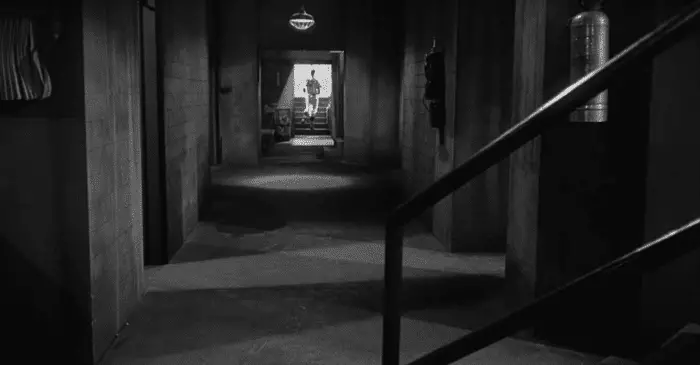
The story of outfielder Jimmy Piersall is pretty standard: high school standout signs with a major league team and works his way up into the majors. It gets a bit different though, when Piersall’s run-ins with mental illness become his biggest obstacle to succeeding in the big leagues. Piersall very famously struggled with bipolar disorder and was prone to outbursts and fights on the field. Fear Strikes Out tells the story of his rise and the challenges he faced, both physical and mental.
Fear Strikes Out is, for a film released in 1957, remarkably sensitive to issues of mental illness. It never feels like Jimmy is a stereotype, largely thanks to Anthony Perkins’s wonderful turn as the real-life player. Perkins plays a remarkably reserved, outright repressed Jimmy, communicating all his bottled-up tension well with just facial and body language. The way that he approaches the game with what might be called absolute terror is mesmerizing, and there’s an absurdity to it all that Perkins always sells. It is a markedly worse film without Anthony Perkins; indeed, he carries Fear Strikes Out on his shoulders to greatness, a testament to his own “hall of fame” talent. — Chris Duncan
The Sandlot (1993, dir. David Mickey Evans)
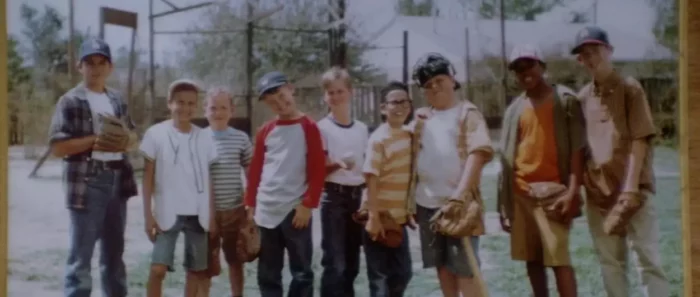
As the 1993 baseball movie The Sandlot begins, it shows a radio announcer enter his office at Dodgers stadium and the camera zooms in to show a picture on the wall of nine boys smiling together on a baseball sandlot field (seen above). Told threw flashback and narration, the film guides the viewers through the summer of 1962 as a group of 11-year old boys bond together over their love of baseball. Scott Smalls (Tom Guiry) serves as protagonist, entering into a new world of baseball fun with his new friends, highlighted by Benny “The Jet” Rodriguez (Mike Vitar) and Hamilton “Ham” Porter (Patrick Renna).
The Sandlot works as a timeless tale of baseball magic because it is a story told out of time. Released in the early 1990s, it echoes back to a nostalgic age for baseball, as its adolescent characters fawn over legends of the game like Babe Ruth. It is also cleverly told at the levels of the kids in the film, with gimmicks of giant “Beast” dog guarding a nearby baseball stronghold, and rival baseball teams marching onto their field like enemy soldiers. When the boys aren’t playing baseball they are also learning coming-of-age lessons about lifeguards and how wrong chewing tobacco can go. The worst comes when losing your stepdad’s valuable baseball feels like the end of the world. The cast of sharp young actors mixed with seasoned adults (Karen Allen, Denis Leary, and James Earl Jones all get their moment) adds up to a satisfying baseball formula for all ages. — Seth Lamey
The Bingo Long Traveling All-Stars & Motor Kings (1976, dir. John Badham)
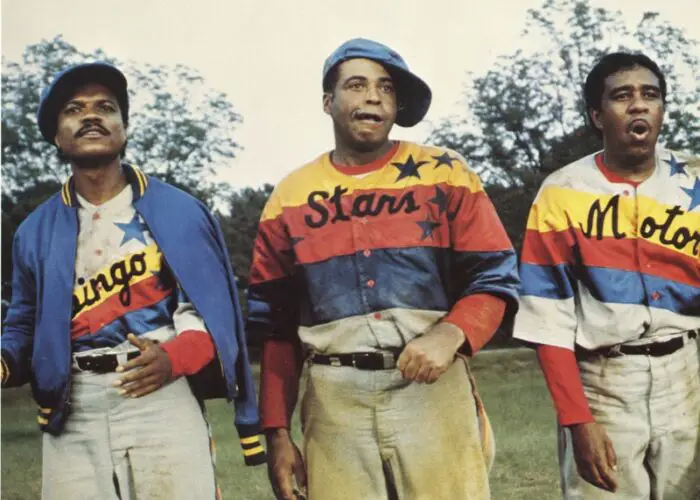
A minor-league modest hit channeling the fervor and fun of the Negro Leagues circa the 1930s, The Bingo Long Traveling All-Stars & Motor Kings remains a glorious romp through history even today, a cleverly cast and lovingly performed tribute to the stars of a league who never got a real shot at the bigs. Most of the action takes place off the field as Bingo Long (played by a typically effervescent Billy Dee Williams) goes rogue, poaching players from opposing Negro League teams to lead a barnstorming tour across the South while outwitting gangsters, hustling rubes, romancing women, and circumventing the law. But he and his teammates shine on the field as well. Between the trash-talking and showboating, there’s plenty of raw talent on Bingo’s Traveling All Stars & Motor Kings lineup, including the hulking slugger Leon Snow (James Earl Jones) and quicksilver outfielder Charlie Snow (Richard Pryor).
The film effortlessly glides along, led by its sterling cast and high spirits. Sure, it looks and feels a bit dated, and some of the teams’ tomfoolery veers a little uncomfortably close to well-worn stereotypes. But The Bingo Long Traveling All-Stars & Motor Kings has great fun playing with history, a little like The Natural, taking apocryphal events and gussying them up with an ebullient charm. Williams’ character is a Satchel Paige type, calling in his outfield and effortlessly striking out the side; Jones’ a Josh Gibson-like catcher with power; and Stan Shaw’s a hybrid of Willie Mays and Jackie Robinson. (The team itself is based loosely on the Indianapolis Clowns and other Harlem Globetrotter-like barnstormers of the era.) No lineup of baseball films is truly complete without this little mid-seventies treasure. — J Paul Johnson
Moneyball (2011, dir. Bennett Miller)
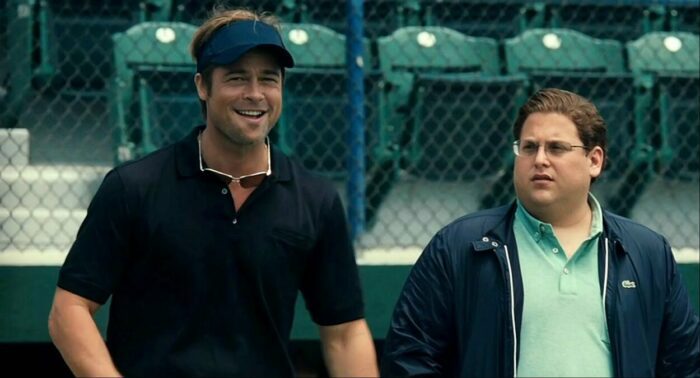
When Aaron Sorkin is on, he’s really on. Moneyball, written by Sorkin and Steven Zaillian, is not just about baseball, it’s about how we talk about baseball, the failure and disappointment at the core of the major league experience, and the excitement of finally shaking up a system that’s grown stale. Brad Pitt’s Billy Beane is a former player turned GM of the Oakland Athletics who, upon meeting young scout Peter Brand (Jonah Hill) and learning about his analytically-driven approach to roster construction, sets out with Brand to construct a competitive team on the cheap after losing key pieces to higher-paying teams. In the process, Beane and Brand played a part in the ongoing analytics revolution in baseball and all professional sports, where advanced metrics and statistics play a key role in how players, coaches, and managers develop rosters and approach the game. In that sense, Moneyball is a great and very informative springboard for understanding what baseball is like today. And in a similar sense, baseball today is a lot like Hollywood: brimming with new voices and approaches, but still in many ways clinging to old ways of thinking. — Chris Duncan


